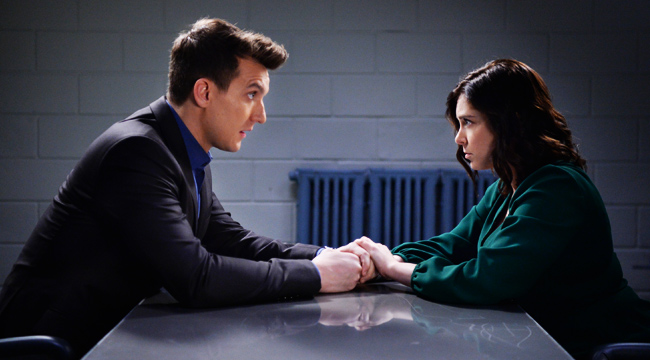
A review of the Crazy Ex-Girlfriend season finale — and thoughts on season three as a whole — coming up just as soon as I forget who John Stamos is…
One of my cardinal rules for TV shows is, “Don’t be afraid to be about what you’re about.” Too often, shows shrink away from the full implications of their premise because the creative team (or a network executive) is afraid that going all the way would turn off too many viewers, even though the best — and often the most successful — shows are the ones that commit early and often to exploring the subject matter.
Crazy Ex-Girlfriend has never been particularly afraid to be about what it’s about (other than maybe a handful of post-pilot episodes, and even those in hindsight feel a bit like putting a frog in a pot of slow-boiling water), but season three was really about what the show is about. The start of the season finally seemed to be fulfilling the show promised by that title, as we got a few episodes of, as Rachel Bloom and Aline Brosh McKenna put it at the end of season two, a comedy version of Fatal Attraction (or Swimfan), with Rachel plotting Josh’s destruction but not really having great ideas about how to do it.(*) The show could have easily stayed in that mode a while longer, if not for the whole season, but instead it moved quickly into the more serious take on the title, confronting Rebecca’s mental illness more directly than ever before, including a suicide attempt and a new diagnosis (preceded by the season’s best song) of borderline personality disorder that put Rebecca into more intense therapy and forced her to recognize the consequences of her actions. The season’s arc showcased Bloom better than ever before, adding new layers of vulnerability and pain to Rebecca’s usual ridiculousness, and provided greater richness to her relationships.
(*) Between the poop cupcakes and Valencia’s song about her movement, this season put it all out there in terms of fecal humor.
Some narrative sacrifices had to be made to get there. Midway through the season, the show ditched its convention of putting Josh’s name into the title of every episode, and even before that point, he’d become a pretty tertiary character, good for periodic comic relief but still around mainly because everyone likes him (and the actor). At times, this felt true for almost every supporting character besides Paula and Nathaniel. A lot of the individual arcs, like Heather impulsively offering to be Daryl’s surrogate, were entertaining, but with Rebecca’s focus primarily turning inward, you could at times feel the show straining to give, say, Valencia something to do, and to make it matter to the larger story being told.
The season finale, “Nathaniel Is Irrelevant,” spent a fair amount of time on the birth(*), and on Daryl and White Josh reconciling as friends (with hints that Josh wants to be more than that), but otherwise continued the season’s focus on Rebecca taking responsibility for her own behavior and the impact it has on other people. She can be a wonderful friend (donating her egg to Daryl), and also a terrible one (lying to Paula about Trent’s blackmail threats), but both the good behavior and the bad stuff is usually so impulsive — and bring out so many unintended consequences — that it can be easy for her to just move on to the next thing and the next without thinking about what she’s just done and how it affects others.
(*) This included a delightful Paula song about just how disgusting and body-altering the experience is for women. Like “Period Sex,” “Heavy Boobs,” and “I Gave You A UTI,” it was a case of the sheer level of blunt detail about the female anatomy making it so funny.
Pushing Trent off a balcony (once again leading to him breaking every bone in his body) doesn’t allow for that usual level of denial. Rebecca winds up in jail, and even though Nathan argues (in another catchy showtune that Rebecca eventually joins in on) that nothing is really her fault — or anyone’s, up to and including Hitler — she sees Paula in the courtroom and realizes that the only way to heal their rift is to take full responsibility with a guilty plea. Like almost everything Rebecca does, it’s a wildly over the top gesture with ramifications she’ll soon learn to regret, but it’s coming from a healthier and more sincere place than these snap decisions usually do.
Bloom and Brosh McKenna have talked about a four-season arc for the show, and Rebecca pleading guilty to attempted murder feels life-altering and constricting enough that it does feel close to the end of the story. Whether we return with some kind of Orange Is the New Black pastiche, or another time jump that takes us to the end of Rebecca’s sentence, the show is going to feel very different once again. Based on how impressively it reinvented itself this year, while remaining extremely, at times painfully, true to itself, I can’t wait to see this planned final chapter.
What did everybody else think?
Alan Sepinwall may be reached at sepinwall@uproxx.com. He discusses television weekly on the TV Avalanche podcast. His new book, Breaking Bad 101, is on sale now.
